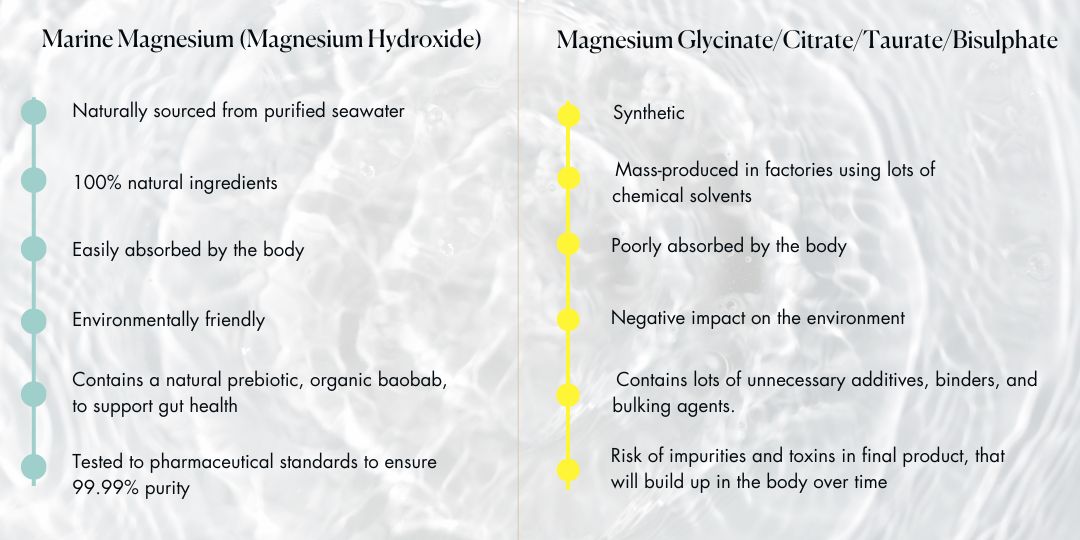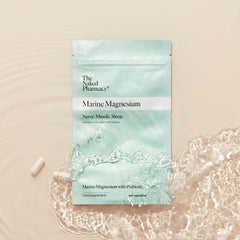Journal
Unveiling the power of Black Garlic: A natural solution for blood pressure
What is blood pressure?
Blood pressure is made up of 2 numbers. The top number is called the systolic blood pressure and measures the pressure your heart is under when blood is pumped out around the body. The bottom number is called the diastolic blood pressure and measures the pressure in our vessels between heartbeats. Blood pressure is measured in millimetres of mercury (mmHg). You may also have heard of high blood pressure referred to as hypertension. In general, women have lower blood pressure than men, this difference decreases as women enter the menopause.
Blood pressure differs depending on your age and this can be seen below:
Blood pressure ranges for adults – 16yrs+
Low BP is classed as under 90/60 mmHg
Ideal BP – Between 90/60 mmHg and 120/80 mmHg
Pre-high blood pressure – Between 120/80 mmHg and 140/90 mmHg
High BP - Over 140/90 mmHg. For over 80-year-olds, this would be 150/90 mmHg

Source: Blood Pressure UK
How can I check my blood pressure?
There are many ways you can check your blood pressure. You can go to your local pharmacy for a free blood pressure check, call your GP surgery or take it yourself at home with a blood pressure monitor. Blood pressure monitors can be bought from pharmacies, big retailers and online.
If you do decide to take your own blood pressure at home here are a few tips to try and prevent an inaccurate reading:
- Drinking caffeine or smoking should be stopped 30 minutes prior
- Give yourself 5 minutes of quiet time before attempting to take the reading
- Take your blood pressure seated with your legs uncrossed and flat on the floor
- Place the blood pressure cuff around your bare arm and make sure the wire is facing upwards and in a central position.
- Place your arm in a relaxed bent position, preferably resting on a table or the arm of a chair
- Don’t talk whilst your blood pressure is being taken
- Press the start button
- Document the reading. Such as 120/80
- Do this 3 times with a 1–2-minute pause in between
If you are trying to track and compare your blood pressure it is recommended to take your blood pressure at the same time each day.
When getting your blood pressure done at the pharmacy or GP surgery most of the above will be done for you but you may find that the reading is higher than when you take it yourself at home. This could be due to something called “white coat syndrome” which is when just being in a healthcare setting increases blood pressure due to anxiety, stress or worry. GPs may offer you a portable 24-hour blood pressure monitor to take home. The monitor measures your blood pressure at regular intervals throughout the day whilst doing your day-to-day activities.
Try taking your blood pressure in both arms and seeing if there is a difference. A small difference in blood pressure readings (around 10 mmHg) between each arm is normal. However, a difference of more than 10 mmHg might be a sign to talk to your doctor. The difference can be in the top number or the bottom number. This could be a sign of peripheral artery disease or developing heart disease in future.

When is the best time to take blood pressure?
The best time to take your blood pressure is twice a day, in the morning and in the evening to get an overall view of how your blood pressure is doing throughout the day.
In the morning, our blood pressure is at its lowest and in the evening between 4 pm and 6 pm, it is at its highest. Our blood pressure can fluctuate by up to 30% throughout the day due to our hormones, our activity level and eating habits.
Ultimately, the best time to take your blood pressure is when it suits you and your lifestyle.
What causes high blood pressure?
There are many causes for high blood pressure. These can be singular or additive or because of a health condition:
- Sedentary lifestyle
- Poor diet
- High stress levels
- Age – Over 50 years old
- Smoking
- Overconsumption of alcohol
- Overweight
- Lack of physical activity
- High salt intake
- Family history of high blood pressure especially in black and Asian populations
High blood pressure can also be caused by other health conditions such as:
- Diabetes
- Kidney problems
- Sleep apnoea
- Thyroid problems

Signs of high blood pressure
High blood pressure doesn’t often result in symptoms until blood pressure is at extremely high levels. You may not realise we have high blood pressure and feel completely normal which is why we should be checking it more frequently as we age. However, there are some physical signs and symptoms that could occur to look out for:
- Visual disturbance – blurred vision, floaters
- Headaches
- Shortness of breath
- Nosebleeds
Blood pressure during the menopause and pregnancy
Hormonal changes such as menopause can indirectly result in higher blood pressure because oestrogen drops during menopause. This female hormone plays a vital role in protecting our cardiovascular system. It stimulates our blood vessels to relax and widen allowing blood to flow more easily. Oestrogen dropping during the menopause has been linked to an increased risk of cardiovascular disease therefore keeping an eye on our blood pressure is recommended.
Blood pressure during pregnancy normally decreases in the first and second trimesters, however high blood pressure can occur and result in the following:
Chronic hypertension
This is high blood pressure before 20 weeks gestation — a woman with high blood pressure before week 20 of pregnancy is likely to have pre-existing high blood pressure.
Gestational hypertension
This is high blood pressure that is new and occurs after 20 weeks' gestation and there is no protein found in the urine.
Pre-eclampsia
This is new high blood pressure presenting after 20 weeks gestation with significant protein from in urine. Pre-eclampsia is a multi-system disorder which can affect the organs of the mother. It is a concern and seeking medical advice immediately is needed. Some of the physical symptoms of pre-eclampsia include vision disturbances, severe headaches, sudden swelling of the face, hands/feet, vomiting and breathlessness.
What causes low blood pressure?
Movements such as going from lying to standing up can sometimes make us feel lightheaded or dizzy for a brief period of time. This is due to something called postural hypotension. This can occur when you are dehydrated due to lower blood volume.
Medications that are taken to lower blood pressure may be taken incorrectly or too much taken can result in low blood pressure. This can also happen with water tablets (diuretics) and heart disease.
Low blood pressure can sometimes also be a sign of a life-threatening emergency such as sepsis, an allergic reaction (anaphylaxis) or heavy blood loss.
What are low blood pressure symptoms?
Low Blood pressure is below 90/60 mmHg and may be accompanied by some of the symptoms below:
- Dizziness
- Lightheaded
- Fainting
- Tiredness
- Confusion
- Falling
How to reduce high blood pressure?
Blood pressure tablets to treat high blood pressure may be prescribed to you. These blood pressure medications are split into various categories and have different mechanisms of action. Below are some of the main groups of medication for high blood pressure.
- Angiotensin converting Enzyme (ACE) inhibitors such as ramipril. Common side effects include a dry cough, dizziness and headaches
- Calcium Channel blockers such as amlodipine. Common side effects include ankle swelling, constipation and headaches
- Angiotensin receptor blockers (ARB) such as candesartan. Common side effects include headaches, dizziness
- Diuretics such as Bendroflumethiazide. Common side effects include needing to go to the bathroom more frequently, postural hypotension and increased thirst.
The timing of your blood pressure medication is down to personal preference if taking a once-a-day dosage. It might be a clever idea to take blood pressure medication at night to minimise the risk of falls and dizziness. However, this wouldn’t be a good idea if taking diuretics due to the side effects of urinary frequency; these would be best taken in the morning.
Statins are also another group of medications that can indirectly lower your blood pressure by reducing cholesterol especially low-density lipoproteins (LDL). Too much of this type of cholesterol can build up along the artery walls and create a narrowing of the arteries resulting in an increase in blood pressure

How to lower blood pressure naturally
We offer a few natural alternatives that could help reduce blood pressure and can be used alongside blood pressure medications and other prescribed medication such as statins:
- Black Garlic
- Marine Magnesium
- Metabolic Gold
These three supplements can be taken together and work in different ways.
Black Garlic with Vitamin D
Our Black Garlic contains fermented black garlic which is more potent than normal raw garlic. Normal garlic contains Allicin and during the fermentation process, Allicin converts to S-Allyl Cysteine (SAC) which is the natural compound responsible for stimulating circulation and lowering blood pressure. Black Garlic can help blood flow more easily and this is why we wouldn’t recommend taking it if you are on any blood thinners or antiplatelets such as Warfarin, Apixaban, Clopidogrel and Aspirin.
Metabolic Gold
Our Metabolic Gold contains Bergamot fruit extract and Artichoke Leaf extract. Both ingredients may improve certain risk factors for heart disease. Lowering cholesterol levels to avoid atherosclerosis and build up along the vessel walls which narrows them resulting in increased blood pressure.
Marine Magnesium
Our Marine Magnesium can also help with blood pressure by relaxing the blood vessels.
Nutrition
Other than supplements we can help our blood pressure through the food we eat and don’t eat.
- Reduce salt intake to less than 6g per day – Not all salts are the same. Here we are referring to table salt that contains sodium.
- Increase consumption of healthy unsaturated fats - oily fish, avocado, eggs and nuts/seeds.
- Reduce consumption of artificial sugars and saturated fats.
- Reduce alcohol intake – 14 units weekly. Try to spread them over a few days rather than consuming them all at once as our liver finds it hard to process. What does a unit of alcohol look like? 40% spirit (25ml), wine (100ml), Beer (180ml).

Exercise
The main thing when it comes to exercise is to do something you enjoy and that you can be consistent with. For heart health, we need to do some form of cardiovascular exercise such as walking, running, swimming or cycling.
150 minutes of moderate intensity (you can still hold a conversation) cardio or 75 minutes of vigorous intensity (you can only speak a few words) cardio a week is recommended by the NHS. It has now been shown that muscle mass and cardio-respiratory fitness are linked with longevity. A full body strength training session is an effective way to do this, aiming for twice a week to maintain muscle mass especially as we age.
Speak to our expert pharmacists today
A key element of our vision is accessibility to our expert advice service; allowing customers to make a personalised and considered decision when it comes to their health.
Our pharmacists are on hand Monday – Friday 9 am – 5 pm. Book your free consultation today! Book Now!
Charlotte Parker-Lennox

Charlotte is a pharmacist with 6 years of experience working in retail pharmacy and integrated urgent care (IUC) alongside nurses, paramedics and doctors.
She has changed the direction of her career to support people with a holistic approach to wellness by treating the root cause of your health concerns. She enjoys an outdoor challenge, completing marathons and cycling adventures around the UK.
Clear the mist - How to combat brain fog
Many of us have experienced moments where our mind feels clouded, making concentration and memory recall more challenging than usual. This is commonly referred to as brain fog and can be very frustrating to deal with. While it’s not a medical diagnosis in itself, brain fog is a symptom that can significantly impact your quality of life.
What is brain fog?
Severe brain fog can be debilitating, particularly if you need to function day-to-day in a high-performance or pressured environment at home or work. It can affect your levels of confidence, self-esteem and performance.
Brain fog causes
Many factors can contribute to brain fog such:
Lifestyle Factors: Poor sleep quality, lack of exercise, and a nutrient deficient diet.
Medical Conditions: Chronic fatigue syndrome, fibromyalgia, anaemia, depression, thyroid disorders. diabetes and post viral syndrome are among the conditions associated with brain fog.
Medications: Certain medications can affect cognitive function as a side effect.
Stress and Mental Health: High-stress levels and mental health issues like anxiety and depression are closely linked to brain fog.
Other factors that can affect brain fog are age, hormonal changes, nutritional deficiencies, and even the aftermath of conditions such as COVID.
Brain fog symptoms
Brain fog manifests as cognitive impairments including:

- Mood swings
- Lack of focus
- Irritability
- Confusion
- Trouble sleeping,
- Low energy or fatigue
- Forgetfulness
- Trouble concentrating
- Low motivation
- Difficulty making decisions
Menopause brain fog
Brain fog during perimenopause and menopause is a real and sometimes challenging symptom faced by many going through the hormonal transition.
Hormonal fluctuations - particularly a decrease in oestrogen and testosterone - are believed to play a critical role in this. When the levels of these hormones begin to fall during perimenopause and menopause, you can experience a range of cognitive symptoms including memory loss, difficulty staying focused, losing your train of thought, and getting confused easily.
Oestrogen is involved in regulating neurotransmitters that affect cognition, including serotonin and dopamine. As these hormone levels fluctuate, so does the clarity of thought, making brain fog a frequent complaint amongst menopausal women.
Testosterone strengthens nerves in the brain and contributes to mental sharpness and clarity, as well as overall energy levels. It also strengthens arteries that supply blood flow to the brain, which is crucial to protect against loss of memory.
Brain fog is very common. In research conducted by the British Menopause Society, almost 40% of the women interviewed reported issues with memory and concentration as they go through the menopause.*
*Menopause - Understanding the impact on women and their partners.
The COVID connection
Post-COVID brain fog has emerged as a lingering symptom for many individuals recovering from the virus due to consequences such as inflammation and the overall stress of dealing with the illness.
In one study, 7.2% of people who reported having long COVID experienced brain fog, and this symptom was more common in those who had a more severe case of COVID-19.
Stress

Chronic stress can increase blood pressure, weaken the immune system, and trigger depression. According to a study undertaken in 2017, stress can also cause mental fatigue.
Chronic stress leads to sustained high levels of cortisol, the body's stress hormone. High cortisol levels can impair cognitive function such as memory and concentration, contributing to brain fog.
Stress can also disrupt the balance of neurotransmitters, such as serotonin and dopamine, which play crucial roles in mood regulation, focus, and cognitive processing. Imbalances in these chemicals can lead to difficulties in concentrating and memory lapses.
Chronic stress is linked to increased inflammation in the body, which can negatively affect brain function and lead to symptoms of brain fog.
Medications
Brain fog is a known side effect of certain medications, such as certain painkillers, antidepressants and sleep medications.
Brain fog can also occur after cancer treatments. This is often referred to as ‘chemo brain’.
Sleep
The NHS recommends that adults should aim for 7 – 9 hours of sleep each night. However, Nuffield Health surveyed 8,000 adults in the UK and found that most adults are getting an average of 5.9 hours of sleep every night in 2023.
Poor sleep quality and sleep deprivation can significantly contribute to cognitive impairments, including reduced attention span, memory issues, and decreased mental clarity.

How to clear the fog
Brain fog can be frustrating, but relief is possible. You should not ignore your symptoms because, if left untreated, brain fog can impact your ability to function and undertake tasks.
Addressing brain fog involves treating underlying causes or making lifestyle changes to improve cognitive function, these include:
Sleep: Ensuring adequate, high-quality sleep can significantly reduce symptoms of brain fog. Aim for 7-9 hours per night and maintain a consistent sleep schedule.
Nutrition: A diet rich in fruits, vegetables, whole grains, and omega-3 fatty acids (found in fish) can support brain health. Avoiding excessive alcohol, sugar, and processed foods is also advisable.
Exercise: Regular exercise increases blood flow to the brain and has been linked to improved cognitive function. Activities like walking, swimming, and yoga can be particularly beneficial.
Stress Management: Techniques such as mindfulness, meditation, and yoga can reduce stress and improve mental clarity.
Hydration: Adequate hydration is crucial for maintaining cognitive function. Aim for 8 glasses of water daily.
Mental Stimulation: Engage in activities that challenge your brain, such as puzzles, learning a new skill, or reading.
Magnesium
Magnesium is an essential nutrient that plays a pivotal role in over 300 physiological processes in the body, including those involved in energy production, sleep quality, and the regulation of neurotransmitters. It’s, therefore, no wonder that magnesium has been identified for its potential to alleviate brain fog.
Magnesium aids in improving brain function by supporting the nervous system, enhancing sleep quality, reducing inflammation, and reducing stress levels—all factors that can mitigate the symptoms of brain fog. For those individuals navigating menopause, magnesium's role in balancing hormones further highlights its significance.
Marine magnesium supplements
Marine Magnesium can help to restore clarity for anyone experiencing brain fog. Our bodies require this micromineral to function healthily however our bodies do not synthesise or store magnesium. It is therefore essential that we get an adequate daily intake from our diet or high-quality food supplements.

“There are so many magnesium supplements on the market, which one should I choose?”
We understand how overwhelming it can be when deciding on which Magnesium supplement you should be taking. The key to selecting the most suitable supplement lies in understanding the difference in the quality and purity of the different supplements available.
Our Marine Magnesium is sourced from purified seawater and is in the form of magnesium hydroxide. Due to its natural and pure source, it is quickly absorbed by the body making it more effective and very gentle on the stomach.
Marine Magnesium contains only 3 ingredients:
- Magnesium (from seawater)
- Organic baobab (natural prebiotic)
- A natural, tapioca capsule shell.
Most other magnesium supplements such as magnesium glycinate, citrate, picolinate and taurate are synthetic and manufactured using chemicals and often contain numerous additives, fillers and bulking agents.
Like your food, it is best to avoid supplements that are overprocessed and contain unnecessary additives that can often affect the supplement's effectiveness and even be harmful to health. Remember to always read ingredient labels to help you choose your supplements wisely - choose NAKED.

Best magnesium supplement
Marine Magnesium has been voted as one of the best magnesium supplements by experts in The Independent. Maz Packham, a nutritionist says:
This supplement (Marine Magnesium) is made from pure seawater plus it has added prebiotic to support the gut. The only other ingredient is its tapioca shell.
Best magnesium supplements, approved by experts | The Independent
Shop Marine Magnesium now
Call our Pharmacists if you have concerns
If you have any concerns about brain fog or any other health conditions, please call our pharmacists for free advice. (+44) 01483 685 630
Dimple Varu

Dimple is a pharmacist with 12 years of experience working in retail and general practice and now specialises in providing education and advice on natural supplements.
She believes in the power of nature and using natural existing compounds to enhance our health, whether that’s treating pain or helping to prevent long-term conditions. Mum of 1, living a busy life, loves reading and baking if she has the time.
The bittersweet truth – The effects of sugar on the brain
What is Alzheimers disease?
 In our lifetime, one in two of us will be affected by dementia whether this is through caring for someone with the condition, developing it ourselves, or both. The NHS defines Alzheimer's disease a progressive neurodegenerative disorder that primarily affects older adults, typically becoming noticeable after the age of 65. The symptoms of Alzheimer's disease worsen over time and can be divided into early, middle, and late stages.
In our lifetime, one in two of us will be affected by dementia whether this is through caring for someone with the condition, developing it ourselves, or both. The NHS defines Alzheimer's disease a progressive neurodegenerative disorder that primarily affects older adults, typically becoming noticeable after the age of 65. The symptoms of Alzheimer's disease worsen over time and can be divided into early, middle, and late stages.(NHS Alzheimers Disease Symptoms)
Dementia is not a specific disease but is a general term used to describe a group of symptoms that affect the ability to think, remember, and perform everyday tasks. Alzheimer's disease is the most common type of dementia.
Alzheimers disease symptoms
In the early stages, subtle memory lapses manifest as forgetfulness about recent conversations, misplacement of items, and difficulty recalling names and objects.
Additional symptoms include impulsive behavior, delusions, speech and language problems, disturbed sleep, and changes in mood. Individuals often require support for daily activities as cognitive decline accelerates. In the later stages, full-time care becomes a necessity.

Deaths registered in England and Wales -ONS UK
What is type 3 diabetes?
Evidence shows that poorly controlled blood sugar can increase the risk of developing Alzheimer’s Disease. This relationship is so strong that Alzheimer’s disease is often referred to as diabetes of the brain or Type 3 diabetes.
Insulin resistance
Insulin is vital for glucose regulation and plays a crucial role in maintaining cognitive function. However, when the brain becomes resistant to insulin, it struggles to utilise glucose effectively, potentially contributing to the development and progression of Alzheimer's disease.
Does sugar cause inflammation?
Excessive sugar intake has been implicated in chronic inflammation throughout the body, and the brain is no exception. Neuroinflammation, triggered by the body’s response to poorly controlled sugar levels, is now recognised as a potential contributor to Alzheimer's disease. The inflammatory response in the brain can lead to the formation of beta-amyloid plaques, a hallmark of Alzheimer's.

Symptoms of too much sugar in your body
It's important to note that the body reacts differently to sugar depending on individual health, metabolism, and the amount and type of sugar consumed. Here are some common symptoms associated with excessive sugar intake:
- Weight gain: high sugar intake, especially from sugary drinks, can contribute to weight gain due to its high calorie content and its ability to increase hunger and craving for more sugary foods.
- Low energy: consuming a lot of sugar can cause rapid spikes in blood sugar levels, followed by sharp drops, which can lead to feelings of fatigue, irritability, and hunger.
- Dental problems: sugar is a leading cause of dental cavities and gum disease as sugar feeds the harmful bacteria in the mouth.
- Mood changes: excessive sugar consumption can lead to mood swings, irritability, and may even contribute to symptoms of depression and anxiety.
- Skin issues: high sugar diets can exacerbate skin conditions such as acne and can contribute to premature aging of the skin.
- Fatty liver disease: excessive intake of fructose, a type of sugar, can lead to a build-up of fat in the liver, which can progress to non-alcoholic fatty liver disease.
- Impact on Sleep: High sugar consumption, especially close to bedtime, can interfere with your ability to have a restful night's sleep.
The scientific evidence
A 2021 study involving 1865 adults over 19 years found a higher risk of Alzheimer's, all types of dementia, and stroke in people who consumed the most sugar, especially in the form of drinks.
A study with 37,689 people found a link between high sugar intake and increased Alzheimer’s risk among women.
A review undertaken in 2022 found that people with type 2 diabetes are up to 90% more likely to develop Alzheimer’s disease or another type of dementia.
A 2022 study with 4,932 people found that the link between Alzheimer’s, high blood sugar, and high cholesterol can begin as early as age 35. Researchers followed the participants over decades. They found that managing cholesterol and blood sugar levels early may help lower the risk of developing Alzheimer’s later.
Metabolic Gold
Metabolic Gold is our natural supplement formulated using pure artichoke leaf extract and bergamot fruit extract. These two botanicals contain bioactive compounds that provides effective support to help control sugar levels and therfore reduce your risk of dementia.
Metabolic Gold will help to improve sugar metabolism, reduce insulin resistance and restore normal cholesterol balance and weight management.

How does Metabolic Gold work?
Metabolic Gold will help to regulate the enzyme, alpha-glucosidase, which is involved in the breakdown of complex carbohydrates into simpler sugars. By inhibiting this enzyme, you can slow down the absorption of glucose from the digestive tract, leading to more stable blood sugar levels.The cholesterol-lowering effects are achieved through stimulating bile flow which in turn helps to break down, bind and excrete excess cholesterol from the body.
Here at The Naked Pharmacy we ensure all of our supplements are formulated using scientific evidence to ensure that they are safe and effective. Here is some trial data to support the use of Metabolic Gold to help manage your sugar levels and reduce the risk of dementia.
A study undertaken in 2019 involving 60 participants found that supplementation with bergamot fruit extract resulted in a significant reduction in sugar levels, LDL cholesterol and triglycerides.
Another study found that supplementing with artichoke leaf extract for 60 days improved sugar control, insulin sensitivity, and reduced LDL cholesterol and weight circumference.
Protecting the brain
It’s never too late to make the lifestyle changes needed to protect your health. Here are a few things you can do to reduce your risk by managing your sugar levels.
Balanced nutrition

Opt for a diet rich in whole foods, emphasising fruits, vegetables, lean proteins, and whole grains. Minimise processed foods and refined sugars. Be wary about hidden sugars in processed foods, drinks, and snacks. Read labels and choose low-sugar alternatives when possible.
Foods with anti inflammatory properties
Eat foods with anti-inflammatory properties such as beans, avocados, green leafy vegetables, berries, fish and incorporate spices such as turmeric and ginger into your cooking.
What are inflammatory foods?
Avoid foods that can cause inflammation such as processed meat, red meat (steak, hamburgers), bread and pasta made with white flour, baked goods (cakes, cookies) and bad sugars.
Our Natruflex Turmeric capsules contain high-strength turmeric containing 95% curcuminoids (the compounds responsible for the anti-inflammatory effects) alongside black pepper extract to increase absorption of the turmeric and we’ve also added in Marine Magnesium.
Regular exercise
Physical activity not only helps regulate blood sugar levels but also promotes overall brain health by enhancing blood flow and reducing inflammation.

Cognitive stimulation
Mental stimulation is vital for maintaining cognitive function. Engage in activities that stimulate the brain, such as puzzles, reading, and learning new skills.
Call our pharmacist if you have concerns
If you have any concerns about sugar or cholesterol or your health risks in general, please call our pharmacists for free advice. (+44) 01483 685 630
Dimple Varu

Dimple is a pharmacist with 12 years of experience working in retail and general practice and now specialises in providing education and advice on natural supplements.
She believes in the power of nature and using natural existing compounds to enhance our health, whether that’s treating pain or helping to prevent long term conditions. Mum of 1, living a busy life, loves reading and baking if she has the time.











